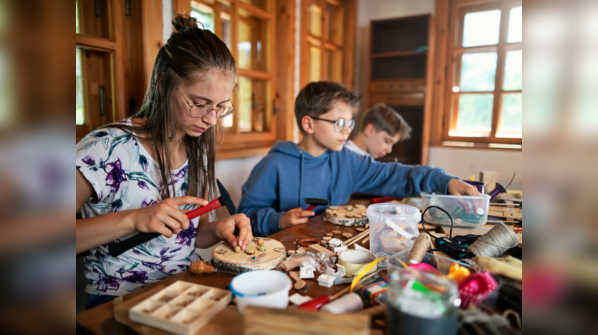Just like adults, children thrive on motivation to improve, develop, and reach their full potential. The journey of growing up is filled with distractions. Learning to navigate these challenges is crucial. Equipping children with these skills early can provide a significant advantage. As Robert Kiyosaki wisely stated, "Your future is created by what you do today, not tomorrow," emphasizing the importance of present actions.
Here are some crucial tips to aid children in avoiding distractions and enhancing their focus:

It's a common instinct for parents to resort to punishment to correct a child's lack of focus. However, this approach often leads to rebellion. Instead of punishment, try positive reinforcement. It can be a powerful tool in helping a distracted child recognize what’s important. Simple praise, like "Good job!" or "Great work!", can have a lasting impact. These positive words resonate with children, prompting them to recall the moment before engaging in actions that might lead to trouble, potentially causing them to reconsider.

Constant nagging about studying, learning, or making friends can backfire and increase distraction. Children are naturally prone to distractions. Pressuring them, instead of patiently guiding them, can lead to stubbornness. Over time, with gentle guidance and patience, children will learn to find their direction and enhance their focus.

Presenting children with overwhelming tasks can make them feel pressured, causing them to avoid future assignments. Children require time to process information, as their minds can only handle so much at once. Faced with daunting tasks, they may opt for enjoyable activities like video games or playing with friends. Breaking tasks into smaller, manageable segments makes them less intimidating. This increases the likelihood of children completing them on time, especially with positive encouragement.

Consider this: Would you engage in something you find boring? Probably not. Similarly, children need novelty. While it's not about turning everything into a game, transforming mundane activities into engaging ones can significantly boost their focus and productivity. Involve children in everyday tasks, such as setting the table or organizing items. These activities often pique their interest, ultimately improving their concentration.

Parents strive to provide the best for their children, including their diet. However, children can be selective eaters, often avoiding essential greens and proteins. A balanced diet plays a vital role in their development. A protein-rich diet, with limited junk food and sugar, will help improve their concentration levels. While occasional treats are acceptable, moderation is key.

In today's world, limiting children's technology use entirely is unrealistic. Instead, manage their screen time. Set clear boundaries for when and how long they can use devices, and what content they can access. Studies show that children perform better in environments free from distractions and stress. Encourage exploration of the outside world, helping them appreciate the beauty of nature beyond screens.

Consider your own experience: As an adult, can you perform optimally on tasks without adequate sleep? A consistent sleep schedule is crucial for a child's ability to focus. Children are more likely to concentrate after a good night's sleep. Ensure they get the recommended 9-12 hours of sleep to prevent crankiness from hindering their focus.

Newer articles
Older articles
 Greg Chappell Hails Rishabh Pant's Revolutionary Impact on Cricket
Greg Chappell Hails Rishabh Pant's Revolutionary Impact on Cricket
 Smith Targets Second Test Return After Baseball Cage Recovery in New York
Smith Targets Second Test Return After Baseball Cage Recovery in New York
 Rishabh Pant's Somersault Celebration Deemed 'Unnecessary' by Doctor Who Oversaw His Recovery From Near-Fatal Crash
Rishabh Pant's Somersault Celebration Deemed 'Unnecessary' by Doctor Who Oversaw His Recovery From Near-Fatal Crash
 Gavaskar Calls for Kuldeep Yadav's Inclusion in 2nd Test Amid Bumrah Fitness Concerns
Gavaskar Calls for Kuldeep Yadav's Inclusion in 2nd Test Amid Bumrah Fitness Concerns
 Rishabh Pant's Composed Reply Dismisses Harry Brook's Sledge in Edgbaston Test: Key Partnership Boosts India
Rishabh Pant's Composed Reply Dismisses Harry Brook's Sledge in Edgbaston Test: Key Partnership Boosts India
 Samsung Unveils Galaxy A35 5G and A55 5G Prices, Availability
Samsung Unveils Galaxy A35 5G and A55 5G Prices, Availability
 Harshit Rana Released: Indian Pacer Exits Squad Before Second England Test in Birmingham
Harshit Rana Released: Indian Pacer Exits Squad Before Second England Test in Birmingham
 Bangladesh Test Captain Najmul Hossain Resigns After Sri Lanka Defeat
Bangladesh Test Captain Najmul Hossain Resigns After Sri Lanka Defeat
 Mirabai Chanu: Weightlifting Demands Constant Mental Focus, Even During Family Time
Mirabai Chanu: Weightlifting Demands Constant Mental Focus, Even During Family Time
 'Manjummel Boys' Star Soubin Shahir Denies Arrest in Film Finance Dispute: Claims of Misleading Accounting Spark Police Probe
'Manjummel Boys' Star Soubin Shahir Denies Arrest in Film Finance Dispute: Claims of Misleading Accounting Spark Police Probe